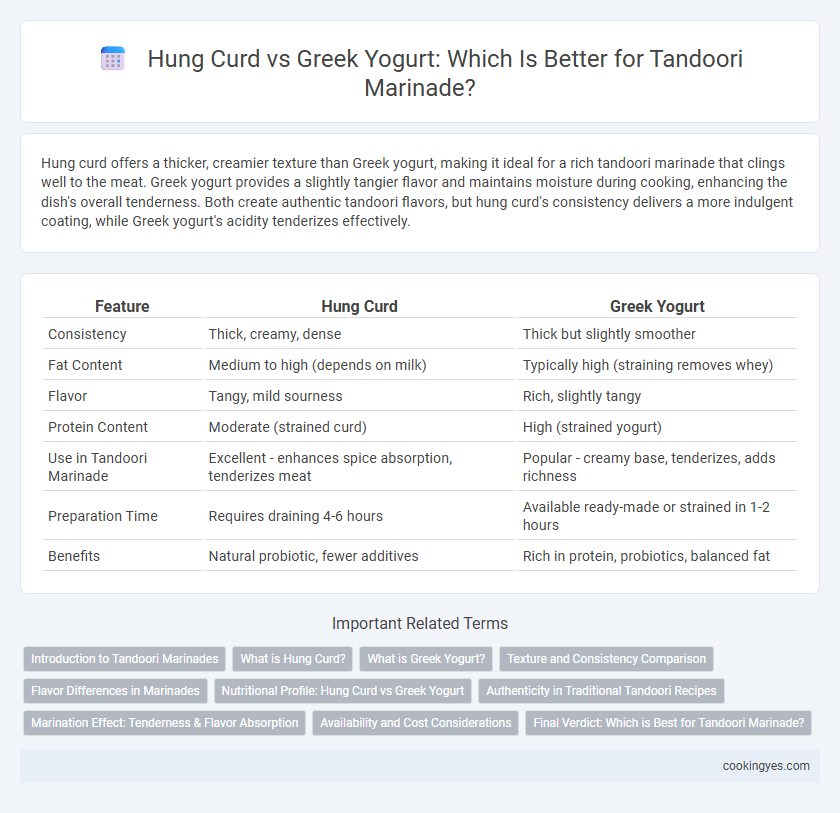Hung curd offers a thicker, creamier texture than Greek yogurt, making it ideal for a rich tandoori marinade that clings well to the meat. Greek yogurt provides a slightly tangier flavor and maintains moisture during cooking, enhancing the dish's overall tenderness. Both create authentic tandoori flavors, but hung curd's consistency delivers a more indulgent coating, while Greek yogurt's acidity tenderizes effectively.
Table of Comparison
| Feature | Hung Curd | Greek Yogurt |
|---|---|---|
| Consistency | Thick, creamy, dense | Thick but slightly smoother |
| Fat Content | Medium to high (depends on milk) | Typically high (straining removes whey) |
| Flavor | Tangy, mild sourness | Rich, slightly tangy |
| Protein Content | Moderate (strained curd) | High (strained yogurt) |
| Use in Tandoori Marinade | Excellent - enhances spice absorption, tenderizes meat | Popular - creamy base, tenderizes, adds richness |
| Preparation Time | Requires draining 4-6 hours | Available ready-made or strained in 1-2 hours |
| Benefits | Natural probiotic, fewer additives | Rich in protein, probiotics, balanced fat |
Introduction to Tandoori Marinades
Tandoori marinades traditionally blend yogurt with spices to tenderize and infuse flavor into meats. Hung curd, thicker and creamier due to its strained consistency, offers a richer coating, enhancing moisture retention during cooking. Greek yogurt, slightly tangier and dense, creates a balanced marinade that tenderizes while imparting a subtle acidity essential for authentic tandoori taste.
What is Hung Curd?
Hung curd is a thickened yogurt made by straining regular yogurt through a muslin cloth or fine sieve to remove excess whey, resulting in a dense, creamy texture ideal for tandoori marinades. Its concentrated consistency allows it to bind spices and meat more effectively, enhancing flavor absorption and tenderness compared to Greek yogurt. The lower moisture content of hung curd prevents the marinade from being watery, which is crucial for achieving the authentic tandoori char and texture.
What is Greek Yogurt?
Greek yogurt is a thick, creamy dairy product made by straining regular yogurt to remove whey, resulting in a higher protein content and lower sugar level. Its dense texture and tangy flavor make it ideal for tandoori marinades, as it helps tenderize meat while enhancing the spices. Compared to hung curd, Greek yogurt provides a smoother consistency and richer taste, improving the overall flavor and moisture retention in tandoori dishes.
Texture and Consistency Comparison
Hung curd offers a thicker, creamier texture compared to Greek yogurt, making it ideal for tandoori marinade as it clings better to the meat. Greek yogurt, while also creamy, has a slightly looser consistency that can result in a thinner coating during marination. The dense texture of hung curd helps retain moisture and intensifies flavor absorption in tandoori dishes, enhancing overall tenderness and taste.
Flavor Differences in Marinades
Hung curd offers a mild, creamy base with a subtle tanginess that enhances the smoky flavors of tandoori marinades without overpowering the spices. Greek yogurt provides a thicker, richer texture and a more pronounced tang, intensifying the marinade's zest and helping tenderize the meat effectively. Choosing between hung curd and Greek yogurt affects not only the marinade's consistency but also the final flavor profile of tandoori dishes.
Nutritional Profile: Hung Curd vs Greek Yogurt
Hung curd contains slightly lower fat and higher protein content than Greek yogurt, making it a leaner option for tandoori marinades. Greek yogurt offers higher calcium levels and probiotics, enhancing gut health while providing a rich creamy texture essential for tenderizing tandoori meats. Both dairy types contribute beneficial nutrients, but hung curd's reduced moisture content intensifies flavor absorption in traditional tandoori preparations.
Authenticity in Traditional Tandoori Recipes
Hung curd is preferred over Greek yogurt in traditional tandoori recipes due to its thicker consistency and lower moisture content, which helps achieve the authentic char and texture. Its natural tanginess enhances the marinade's flavor profile without overpowering the spices. Greek yogurt, while similar, often contains stabilizers and slightly milder acidity, making it less ideal for replicating the genuine tandoori taste and mouthfeel.
Marination Effect: Tenderness & Flavor Absorption
Hung curd offers a thicker consistency and lower moisture content compared to Greek yogurt, enhancing marination by allowing the tandoori spices to cling better and penetrate deeper into the meat. Greek yogurt, while creamy and rich in probiotics, has higher moisture, which can dilute the marinade and slightly reduce tenderness and flavor absorption. Using hung curd in tandoori marinades results in more tender meat with intense, concentrated flavor due to its ability to lock in the spice blend effectively.
Availability and Cost Considerations
Hung curd, made by straining regular curd to remove whey, is often less widely available than Greek yogurt in many urban markets, making Greek yogurt the more accessible option for tandoori marinades. Greek yogurt, produced through industrial straining, tends to be priced higher due to processing costs but offers consistent quality and texture ideal for marination. Home preparation of hung curd can reduce costs significantly, making it a budget-friendly choice if time and access to fresh curd are not limiting factors.
Final Verdict: Which is Best for Tandoori Marinade?
Greek yogurt is the best choice for tandoori marinade due to its thicker consistency and lower water content, which helps the spices adhere better and creates a richer, creamier texture. Hung curd, while also thick, can be slightly more acidic and less uniform, impacting the delicate balance of flavors in tandoori dishes. Overall, Greek yogurt enhances the marinade's ability to tenderize meat and deliver authentic, robust taste.
Hung curd vs Greek yogurt for tandoori marinade Infographic

 cookingyes.com
cookingyes.com